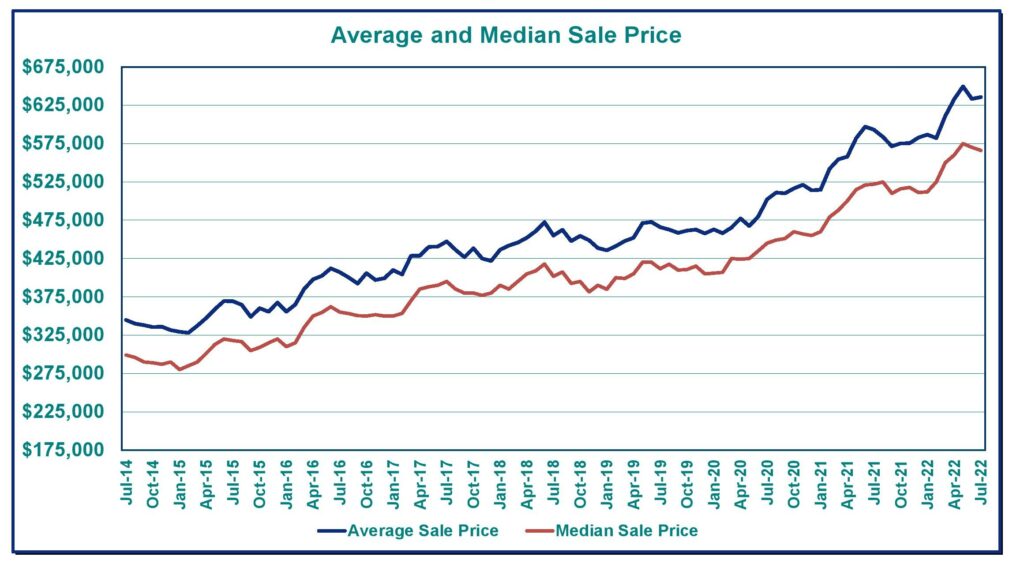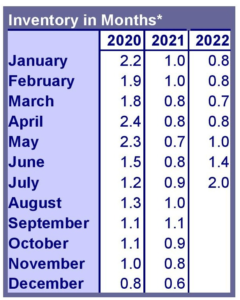News outlets benefit from sensationalism, so sometimes it’s difficult to accurately assess headlines.
No one can predict the future of Oregon real estate with 100% accuracy, yet there are basic facts for context about what some might presume is ‘clickbait’ news.

The Long Game
Depending on where in Oregon you live, our market has seen a runup of around 80+% over the past eight years. Compared to many other investments, that rate alone is remarkable. The term ‘sustainability’ is often used in the context of environmental concerns, yet applies here, too. That’s because real estate tends to be cyclical and a 10% annual appreciation pathway is not historically sustainable, or experienced without some market hiccups. The good news is that over the long term, real estate has proven to be a good investment that tends to increase in value.

Will Oregon’s Real Estate Sky Fall?
Are we in the process of seeing a shift? Probably. Will there be a downturn anytime soon? Possibly. Yet if there is a correction, based on current factors you can expect a relatively moderate drop in value unlikely to have the kind of impact seen in the last major downturn. Here are a few reasons why.
 Inventory 101
Inventory 101
Normal housing inventory (where neither buyers or sellers have the advantage) is often considered as between three to six months of home supply. For years, Oregon has seen a dramatic shortage of homes, well below even the three month level. Anything below a three month home supply is considered a ‘seller’s market’ favorable to homesellers. Above a six month home supply is considered a ‘buyer’s market’ favorable to homebuyers. Supply chain issues, labor shortages, plus zoning restrictions have all helped to keep Oregon’s housing supply low, especially of late. The below inventory report is for the greater Portland metro area.

Stronger Owners
For context to these figures, Oregon home inventory approached 23 months of supply during the 2008-2011 housing market downturn. That’s more than ten times the current level. Since then, lending practices became stricter, meaning more homeowners have greater equity than in the past. One reason is because loan underwriters generally require homeowners to make a larger down payment and also meet more stringent borrowing requirements, like credit and income. This means that if tight financial times hit, rather than being foreclosed upon, most of these homeowners are in a stronger financial position with significant equity in their property and would likely sell if needed. This obviates the likelihood of another 2008-2011 style downturn with massive foreclosures.
What Caused This?
A case can be made that the cause of our most recent market shift is due in part to the Federal Reserve’s monetary decision to raise interest rates. When interest rates rise, homebuyers are more limited in what they can afford. This tends to take our economy’s ‘foot off the gas,’ essentially ‘placing a brake’ on home sales and otherwise concomitant large housing price increases.
 A Question of Balance
A Question of Balance
Given current market forces, a more balanced housing market now seems inevitable. What does this mean? Expect buyers to have more choices, since they’ll be working with more motivated sellers incentivized to price their properties close to the true market value. Out of every group of homesellers, some tend to be more focused on selling and will price their properties accordingly. These will be the homeselling success stories.
The Bottom Line
Regardless of what news headlines suggest, Oregon real estate is positioned to weather market shifts considerably better than in the past. Yet experts differ on precisely what the future holds in the meanwhile. For now, some suggest an annual downturn in home values of 4% or maybe more, while others forecast positive, but more tempered home price growth, likely closer to half of our recent annual increases.
Understand that real estate is local. What happens in other states may not have the same effect here. That’s because building demand, construction costs, zoning restrictions, land supply, labor availability and housing inventory are often uniquely different between markets. One size does not fit all. The bottom line is that with professional assistance by a Realtor who successfully navigated the last downturn, your market priced property will sell and on the flip side, you’ll experience opportunities for a successful home purchase. The cherry on top? If you purchased your home more than a year ago, chances are you’ll be reaping a profit when you do decide to sell.

Want More Information?
Thinking about buying or selling an Oregon property? For a free consultation, contact Certified Realty using the form below, or email Info@CertifiedRealty.com today.
